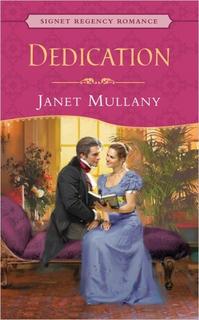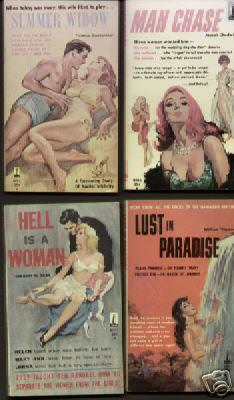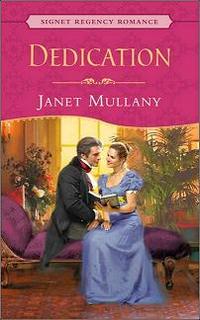
 Janet was brought up in England where she read Georgette Heyer when she should have been studying for some exams, didn’t read Jane Austen when she should have (for some more exams) but rediscovered her later in life, and didn’t want to be a novelist when she grew up. She has been an archaeologist, draftsperson, radio announcer, arts administrator, proofreader, and bookseller.
Janet was brought up in England where she read Georgette Heyer when she should have been studying for some exams, didn’t read Jane Austen when she should have (for some more exams) but rediscovered her later in life, and didn’t want to be a novelist when she grew up. She has been an archaeologist, draftsperson, radio announcer, arts administrator, proofreader, and bookseller.
Learn more at www.janetmullany.com
Praise for Dedication!
“I’d encourage every Regency fan (except perhaps for sensuality sticklers) to run out and get this book. It’s entertaining, thoughtful, and more than worth your time.” — Blythe Barnhill, for All About Romance Read the review
“This isn’t a fluffy book, but a deeply psychological love story. For me, this depth of character and plot was refreshing, and made the book a constant surprise.” — Cybil Solyn, for Rakehell Read the review
“One of the best Regencies I have read in years. Very highly recommended.” — DeborahAnne MacGillivray, for The Best Reviews Read the review
Interview
Q. How did you think of writing this particular book? Did it start with a character, a setting, or some other element?
The first scene–that of a man knocking at the door of a London house early in the morning– came into my head strongly enough that I was able to build the plot and characters from there. I don’t know why it works this way for me, but it does.
Q. How long did it take? Was this an easy or difficult book to write?
It was a much revised book, but it was always easy to write. It began first as a single-title regency set historical, and had a rather convoluted plot. Adam was a codebreaker for English intelligence, and Fabienne his major suspect as a spy. I had a near miss with an editor who suggested I drop the spy plot and make it more a comedy of manners, so I revised it and she rejected it via form letter (one of those character building moments). It was never was a comedy of manners, and it continued to bomb until it won the 2004 Royal Ascot Contest (sponsored by the Beau Monde) and Signet made me an offer for it later that year. I had to chop off 20k words, so the subplot almost disappeared, but at least almost all the sex stayed intact!
Q. Tell me more about your characters. What or who inspired them?
I’ve no idea where Fabienne and Adam came from. I think they were based on what I didn’t want to write about or read about. I was interested in characters who had had experience in life, including good relationships with other partners, friends, and family,and who had not been holding grudges or harboring revenge plans for decades. In other words, fairly complex and healthy people, who were mature enough to solve their own problems but were also human enough to make mistakes. So that’s how I ended up with a heroine in her late 30s and a hero in his early 40s, both widowed.
Q. Did you run across anything new and unusual while researching this book?
I did some research on Elizabeth Vigee-Lebrun, a French portrait painter, and used that to create one of my minor characters, Elaine, although she’s from a much different background. I grew up in England, so I have the advantage of knowing what houses and the countryside look like, and how people speak. My mind is a vast repository of trivia, and it’s amazing that some of the stuff in there is useful. I also did some research on French emigres to England after the revolution. Basically I’m a sloppy researcher, and I can only hope my mistakes aren’t too embarrassing.
Q. What do you think is the greatest creative risk you’ve taken in this book? How do you feel about it?
When I was writing it I had no sense whatsoever that I was taking risks, although I did become accustomed to mutters (and shouts!) from CPs that I was breaking rules, editors wouldn’t like what I was doing, and/or I wasn’t writing a romance. I’m happy to say I didn’t let it faze me. In retrospect, I think my greatest risk is in having a hero who is older than the norm, uses reading glasses, and is an atheist, grandfather, and novelist.
Q. Is there something in the book you originally included but left out because you thought it was too controversial?
Well, originally I had the villain eaten by the hero’s pigs, which is a wonderful way to kill off someone, and I hope I can use that elsewhere! (Spoiler follows!) One of the few times I dropped something was the scene where Fabienne’s brother finds she’s pregnant. In the original, she had decided to abort the pregnancy, and he stops her. The reaction from my CPs was one of unanimous horror (to put it mildly). So as it is now, her maid (who would of course know her mistress’ cycle) picked up the abortifacient for Fabienne, and her brother prevents her from taking it. He’s concerned about her health and the honor of the family, not because he’s thinking of an unborn baby. I still think the original was stronger; women don’t always welcome an unplanned pregnancy with overwhelming joy, and Fabienne is in despair after she ended her relationship with Adam.
Q. Your book is very racy; how did you keep thoughts of your kid(s), parents, friends, and the local grocer from intruding when you were writing those scenes?
Oh, my God, who told you about me and the grocer? I really don’t find it that different from writing any other sort of scene. I don’t think about them then either, although I do find it alarming how much I reveal of myself through my writing generally. That’s why I very rarely let non-writers read my works in progress. You must bear in mind, too, that the characters tended to take over. I had no idea, for instance, on p. 79, what Adam was about to do to Fabienne on p. 80. Honest.
Q. What are you working on now?
I’m revising my regency chicklit (if you want to see what a regency chicklit is like, go to my website and check out my excerpts) and writing a new regency-set erotic romance novella. I’d love to do a sequel to Dedication, based on the relationship between Barbara (Adam’s daughter) and Ippolite (Fabienne’s brother) but given the condition of the market I don’t think there’s anywhere for it to go.
Thanks for interviewing me!






